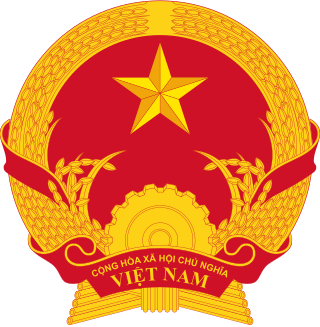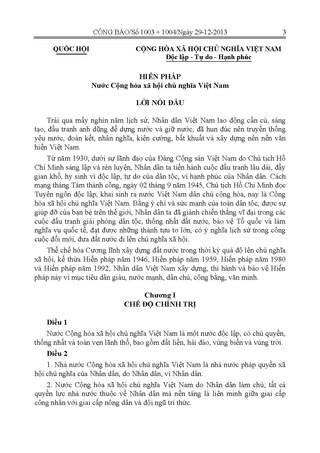These are lists of incumbents, including heads of states or of subnational entities.

The Supreme Soviet of the Union of Soviet Socialist Republics was, from 1936 to 1991, the highest body of state authority of the Union of Soviet Socialist Republics (USSR), and based on the principle of unified power was the only branch of government in the Soviet state.

The politics of Vietnam is dominated by a single party under an authoritarian system, the Communist Party of Vietnam (CPV). The President of Vietnam is the head of state, and the Prime Minister of Vietnam is the head of government. Both of these offices are separate from the General Secretary of the Communist Party of Vietnam, who leads the CPV and is head of the Politburo and the Central Military Commission. The General Secretary is thus the de facto highest position in the Vietnamese politics.
A council of state is a governmental body in a country, or a subdivision of a country, with a function that varies by jurisdiction. It may be the formal name for the cabinet or it may refer to a non-executive advisory body associated with a head of state. In some countries it functions as a supreme administrative court and is sometimes regarded as the equivalent of a privy council.

A communist state, also known as a Marxist–Leninist state, is a one-party state in which the totality of the power belongs to a party adhering to some form of Marxism–Leninism, a branch of the communist ideology. Marxism–Leninism was the state ideology of the Soviet Union, the Comintern after its Bolshevisation, and the communist states within the Comecon, the Eastern Bloc, and the Warsaw Pact. After the peak of Marxism–Leninism, when many communist states were established, the Revolutions of 1989 brought down most of the communist states; however, Communism remained the official ideology of the ruling parties of China, Cuba, Laos, Vietnam, and to a lesser extent, North Korea. During the later part of the 20th century, before the Revolutions of 1989, around one-third of the world's population lived in communist states.

The President of the Soviet Union, officially the president of the Union of Soviet Socialist Republics, abbreviated as president of the USSR, was the head of state of the Union of Soviet Socialist Republics from 15 March 1990 to 25 December 1991.
The government of Czechoslovakia under Marxism–Leninism was in theory a dictatorship of the proletariat. In practice, it was a one-party dictatorship run by the Communist Party of Czechoslovakia, the KSC.
These are lists of political office-holders in East Germany. The political leadership of East Germany was distributed between several offices. However, until the Volkskammer removed a section in the GDR's constitution guaranteeing their monopoly on political power on 1 December 1989, the Socialist Unity Party of Germany (SED) held ultimate power and authority over state and government. Thus, the head of the SED's Politburo of the Central Committee was the de facto leader of the country.

The president of the Socialist Republic of Vietnam or simplier the state president is the head of state of Vietnam, elected by the National Assembly of Vietnam from its delegates. Since Vietnam is a one-party state, candidates for the post are nominated by the Central Committee of the Communist Party of Vietnam. The officeholder is generally considered to hold the second-highest position in the political system, practically after the General Secretary of the Communist Party of Vietnam.
A provisional government, also called an interim government, an emergency government, a transitional government or provisional leadership, is a temporary government formed to manage a period of transition, often following state collapse, revolution, civil war, or some combination thereof.
A presidium or praesidium is a council of executive officers in some countries' political assemblies that collectively administers its business, either alongside an individual president or in place of one. The term is also sometimes used for the governing body of European non-state organisations.
The President of the Council of Ministers is the most senior member of the cabinet in the executive branch of government in some countries. Some Presidents of the Council of Ministers are the heads of government, and thus are informally referred to as a Prime Minister or Premier.
State Council may refer to:

The Vietnamese Constitution or the Constitution of Vietnam, fully the Constitution of the Socialist Republic of Vietnam, is the fundamental and supreme law of the Socialist Republic of Vietnam. The current constitution was adopted on November 28, 2013, by the Thirteenth National Assembly and took effect on January 1, 2014, being the third constitution adopted by the Vietnamese state since the political reunification of the country in 1976.
The German Democratic Republic was created as a socialist republic on 7 October 1949 and began to institute a government based on the government of the Soviet Union during the Stalin era. The equivalent of the Communist Party in East Germany was the Sozialistische Einheitspartei Deutschlands, which along with other parties, was part of the National Front of Democratic Germany. It was created in 1946 through the merger of the Communist Party of Germany (KPD) and the Social Democratic Party of Germany (SPD) in the Soviet Occupation Zone of Germany. Following German reunification, the SED was renamed the Party of Democratic Socialism (PDS), which eventually merged with the West German Electoral Alternative for Labor and Social Justice to form the modern Left Party.

The Prime Minister of the Lao People's Democratic Republic, formerly the chairman of the Council of Government of the Lao People's Democratic Republic, is the head of government of Laos. The highest position in the government, they direct the country's executive branch. The prime minister is accountable to the president, the National Assembly and the country's only legal party: the Lao People's Revolutionary Party (LPRP). The current prime minister is Sonexay Siphandone, who was elected in 2022.

The Socialist Constitution of the Democratic People's Republic of Korea is the constitution of North Korea. It was approved by the 6th Supreme People's Assembly at its first session on 27 December 1972, and has been amended and supplemented in 1998, 2009, 2012, 2013, 2016, 2019 (twice), and in 2023. It replaced the country's first constitution which was approved in 1948.
The highest organ of state power is the representative organ in communist states that functions as the sole branch of government according to the principle of unified power. For example, the government of the Soviet Union was designated as the highest executive and administrative body of the highest organ of state power, the All-Union Supreme Soviet.

The Order of José Martí is a state honor in Cuba. The Order was named so after José Martí, the national hero of Cuba. The design was realized by the Cuban sculptor José Delarra.

The chairman of the Standing Committee of the Supreme People's Assembly, formerly known as the president of the Presidium of the Supreme People's Assembly, is the presiding officer of the Standing Committee of the Supreme People's Assembly, which is the permanent body of the Supreme People's Assembly, North Korea's highest organ of state power.
 President of the Council of State of Belgium (Head of the Supreme Administrative Court)
President of the Council of State of Belgium (Head of the Supreme Administrative Court) President of the Council of State of Colombia (Head of the Supreme Administrative Court)
President of the Council of State of Colombia (Head of the Supreme Administrative Court) President of the Council of State of Greece (Head of the Supreme Administrative Court)
President of the Council of State of Greece (Head of the Supreme Administrative Court) President of the Council of State of Italy (Head of the Supreme Administrative Court)
President of the Council of State of Italy (Head of the Supreme Administrative Court) President of the Council of State of Luxembourg (Head of the supreme advisory body to the Government)
President of the Council of State of Luxembourg (Head of the supreme advisory body to the Government) President of the Council of State of Spain (Head of the supreme advisory body to the Government)
President of the Council of State of Spain (Head of the supreme advisory body to the Government) President of the Council of State of Turkey (Head of the Supreme Administrative Court)
President of the Council of State of Turkey (Head of the Supreme Administrative Court) President of the Council of State of France (held by the Prime Minister
President of the Council of State of France (held by the Prime Minister  President of the Council of State of the Netherlands (held by the King)
President of the Council of State of the Netherlands (held by the King) President of the Council of State of Portugal (held by the President)
President of the Council of State of Portugal (held by the President) President of the State Council of South Korea (held by the President)
President of the State Council of South Korea (held by the President)







